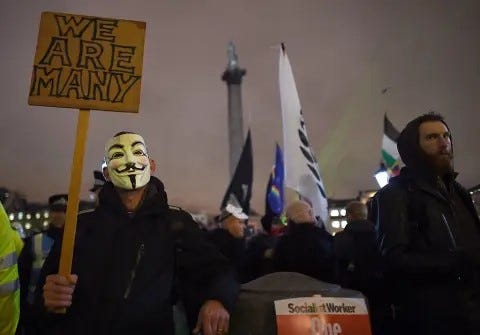Character as Politics
How elite behavior and rhetoric drive the impulse to revolt
The powerful tide of protest and populism that typifies our moment in time has been propelled primarily by deep structural causes, as I have had occasion to note. But what might be considered moral judgments—specifically, the public’s assessment of elite behavior and rhetoric—have also added fuel to the flames of revolt.
The public has always paid close attention to elite behavior and set its standards accordingly. Children were told to aspire to George Washington’s honesty, Thomas Edison’s determination, and Franklin Roosevelt’s nobility after contracting polio. Aware that they held the monopoly on fame, elites insisted on being represented as paragons of dignity and virtue. The concept of a “right to privacy” was born out of future Supreme Court Justice Louis Brandeis’s indignation that plebeian photographers and reporters had “invaded the sacred precincts” of private life at the summit of the social pyramid. The elites wished to set a good example to the lower orders—but that example was carefully posed.
Mass media obliged. In the 20th century, a wall of silence was erected around elite sins and indiscretions. A famous example is the family-friendly coverage of President John F. Kennedy’s tenure in the White House, which never touched on the president’s extensive extramarital escapades. The facts of the matter were known, but—since they would tarnish the good character of the mighty—they were not considered fit to print.
Until recently, political leaders like President John F. Kennedy, could count on the media not to expose their indiscretions.
The same courtesy was extended to film stars and professional athletes whose private lives did not measure up to their public image. The price of fame, not so long ago, was the perception of wholesomeness.
The tsunami of digital information that swept over the globe in the present century has smashed these tidy arrangements to pieces. In a real sense, private life has moved online. Three billion smartphones in the hands of the public, each with a digital camera, all connected to the ceaseless babble of the web, have turned individual experience into a performing art—a process of self-exposure in which we live to post on Facebook or Instagram. And, of course, we can at any moment be exposed by the people around us. There are 300 million photos uploaded to Facebook every day. There are 500 hours of video uploaded to YouTube every minute. It is no exaggeration to say that the surveillance conducted by a ubiquitous public far outstrips that of the state.
As a result, the power of control over representation has flipped. Today, elites’ failure, scandal, falsehood, and arrogance set the information agenda. Politicians like Anthony Weiner who are seduced by the performative culture of the web are invariably destroyed by it. And those who take extraordinary measures to retain the old protections, as Hillary Clinton did by using a personal server for State Department business, are punished for trying. In the new dispensation, all things hidden are revealed—in fact, those who assert the privilege of concealment run the risk of attracting viral attention, and a storm of ridicule, to themselves. This paradox actually has a name: the “Streisand effect,” named for singer Barbra Streisand, whose attempt to suppress the publication of photos of her mansion resulted in dramatically more attention being paid to the pictures. Even if institutions like the media wish to protect an elite figure, they lack the means to do so. The thefts of over 250,000 State Department cables in 2010, and of nearly 20,000 Democratic National Committee emails in 2016, illustrate just how easy it is to hack and disseminate digital communications.
Some politicians are seduced by the performative culture of the web, only to later be destroyed by it.
The public, riding the new technology, has trampled into the sacred precincts of authority and now subjects every aspect of elite life to a relentless scrutiny. The #MeToo movement, for example, has cast a light into the shadows of elite male predation, with meaningful political consequences. A heavily favored Republican candidate for the Senate in Alabama was defeated when allegations surfaced that he had pursued relationships with underage women. A Democratic senator was forced to resign after being accused by several women of inappropriate behavior. More than a few prominent men in the news business have lost their jobs for the same reason.
The public, riding the new technology, has trampled into the sacred precincts of authority and now subjects every aspect of elite life to a relentless scrutiny. The #MeToo movement, for example, has cast a light into the shadows of elite male predation, with meaningful political consequences. A heavily favored Republican candidate for the Senate in Alabama was defeated when allegations surfaced that he had pursued relationships with underage women. A Democratic senator was forced to resign after being accused by several women of inappropriate behavior. More than a few prominent men in the news business have lost their jobs for the same reason.

In the context of these revelations, the language of the elites often sounds detached from reality. Politicians at the highest level seem to imagine themselves as the judges rather than the judged. In 2012, a video was leaked of Mitt Romney saying, “There are 47 percent of the people who will vote for the president no matter what. . . . There are 47 percent who are with him, who are dependent on government . . . who believe the government has a responsibility to care for them, who believe they are entitled to health care, to food, to housing, to you-name-it. That’s an entitlement. . . . These are people who pay no income tax.” In 2016, Hillary Clinton stated at a fundraising event, “You know, just to be grossly generalistic, you could put half of Trump supporters into what I call the basket of deplorables. Right? The racist, sexist, homophobic, xenophobic, Islamophobic—you name it. And unfortunately there are people like that. And he has lifted them up.”
Both Romney and Clinton were candidates for the presidency in a democratic nation—but they were also elites talking to other elites, blind to the perspective of the ordinary voters whom they appeared happy to write off, in their tens of millions, as morally beyond the pale.
This rhetoric of contempt, which seeks to insert an immense existential distance between the top of society and all the rest, is by no means a monopoly of the American political establishment. Emmanuel Macron of France compared his presidential style to that of Jupiter, father of the gods, and frequently used the glittering palace of French kings, Versailles, as a backdrop. The massive Yellow Vest protests that swept over the country in October 2018 were, to a considerable degree, a revolt against Macron’s Olympian indifference to the public’s concerns. Yet the only fault perceived by Gilles Le Gendre, parliamentary leader of Macron’s party, was that government policies had been “too intelligent, too subtle, too technical” for ordinary persons to grasp.
Similarly, in the aftermath of Brexit, shocked elites around the world sought to explain the development in terms of the stupidity of the British public. Favorite media tropes portrayed pro-Brexit voters regretting their foolish impulse—a condition instantly christened “Bregret”—or frantically Googling “What is the EU?” hours after the vote was over. “Inviting a largely uninformed public to make a judgment on something as unimaginably complex as our membership of the EU,” sneered one commentator, “was akin to asking a six-year-old to perform delicate brain surgery—with a crayon.” Yet it was the elites, not the public, who had allowed the distance between the top and the rest to cloud their assessment of political reality.
Elite behavior, in brief, is perceived by the public as that of an entitled if not decadent class. Elite rhetoric appears both disdainful and false. The degree of the harshness of these judgments can be debated, but they are not, on any accounting, baseless.
The political consequences extend beyond gossip or scandal touching a few individuals to questions about the legitimacy of the democratic system. Every revelation deepens the public’s cynicism about what remains hidden. According to a July 2019 Pew opinion survey, 69 percent of Americans believe that the government conceals important information, while 61 percent think that the news media does the same. Outbursts of contempt in the Romney-Clinton style convey the sense that government functions as a mutual protection society for the powerful. Thus the Edelman Trust Barometer for 2020 reports that “government and media are perceived as both incompetent and unethical,” with 57 percent of the public saying that government “serves the interest of only the few.”
Protest movements around the world are often driven by contempt for political and business elites.
Structural reasons are chiefly responsible for this collapse in the authority of our political institutions. But there is also human failure. Because the elites serve as the interface between institutions and the public, antiestablishment protests take on a decidedly human dimension. The Yellow Vests, for example, are held together by their loathing of Macron.
Spain’s indignados of 2011 told their elected officials, “You do not represent me.” In the same year, here in the United States, the Occupy movement claimed to speak for the “99 percent” against the rapacity of the top 1 percent. The rebels in Chile’s ongoing uprising have mocked without mercy the country’s president, Sebastián Piñera, whom they have nicknamed “El Pizza.”
Parents today are unlikely to hold up presidents or prime ministers as models for their children, let alone to name their sons or daughters after honored political leaders, as was common in the past.
There is also a demonstrable human aspect to the recent electoral success of populism. Populist personalities in the mold of Donald Trump or Brazil’s Jair Bolsonaro tend to do and say eccentric, often controversial, things. Part of their charm for voters lies precisely in that eccentricity and controversy: almost by definition, and certainly by intent, populists don’t act or sound like the elites who fill the ranks of professional politicians. Questions of character, in this context, turn on the pervasive mood of repudiation. When populists are accused of being offensive or unethical, we must keep in mind that their accusers—establishment media and political actors—have already been judged and found guilty by the public. For this to change, the elites have to change. Somehow, those at the top have to regain their good character in the eyes of the public. They must discover ways to win respect in the chaotic theater of the web, and they must develop a rhetorical style adapted to the digital age. The fact that, so far, they appear utterly unwilling to try should not be surprising. If the 20th century was a golden age of top-down control, the 21st is a sort of Dante’s Inferno—with ever deeper circles of torment—of the elites. A reactionary temper is the natural outcome of such a fall from the heights.
In part, this is a generational question. As Derek Thompson observes, the three presidential candidates still standing as of this writing are “divided in ideology, but united in dotage.” The average age in Congress today, Thompson adds, is “near an all-time high,” while that of incoming CEOs in S&P 500 companies “has increased by 14 years in the past 14 years.” Our elite class is in essence a gerontocracy. Its life experience is truly anchored to the 20th century. Given the human condition, this cannot last. Even now, the churn of protest and populism is raising fresh faces to prominence—people born into the digital universe and comfortable with the performative mode of life. They will, at a minimum, look forward rather than back, because that is the only perspective possible for the young, and soon they will usher the oldsters offstage.
The public, I believe, will play the decisive role in the coming churn of the elites. The latter are not a Marxian class with a predetermined consciousness, after all: they are merely the people at the top of a very complex hierarchy. Writing in 1921, the great Spanish thinker José Ortega y Gasset insisted that such hierarchies appear naturally and spontaneously and that elites in every society are in a certain sense “selected” by a “reciprocal action” with the public. By the way it allocates its votes, its time, its attention, its purchases, its admiration and its condemnation, the public selects specific individuals into elite status. This process may now seem stuck in the rule of the old, but it will soon be blown wide open by a generational shift.
The public will have choices, and the criteria for choosing new elites could include judgments about personal integrity and character. If we need a change in elites to rescue our democratic institutions, responsibility for that change will be in the hands of the public.






